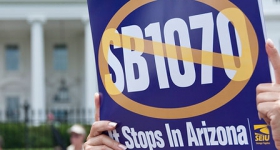Alabama Governor Robert Bentley doesn't want to be "the face of illegal immigration bills."
Be careful what you wish for. That’s what we were told as kids, anyway, but it's a good piece of advice that politicians might want to keep in mind when dealing with the hot button topic of undocumented immigration.
Alabama Governor Robert Bentley signed House Bill 56 into law earlier this month, a law which prohibits businesses from making contracts with undocumented immigrants. But now that immigrant workers are packing up and leaving town, he seems to be hesitant to drum up praise for it since it went into effect.
Turns out he believes it has damaged his state’s reputation by enforcing the stereotype of racist Deep South attitudes.
This article quotes him as telling the Associated Press, “I don’t want to be perceived as the face of illegal immigration bills in the country, and I could be that.”
Now why might that be? Aren’t you proud of what you’ve accomplished?
Ideology is great if you’re running for office, but it doesn’t always translate neatly from paper to practice. While HB 56 supporters might say that this is victory in the fight to control undocumented immigration, some Alabama businesses are reporting trouble replacing their immigrant workers, particularly with regards to harvesting crops.
Ah, yes. Again, be careful what you wish for.
Though Gov. Bentley assured Alabama’s farmers, meat processors and housing contractors that US citizens would fill the positions vacated by immigrant workers, business owners are finding that not to be the case.
One Alabama tomato farmer, Jerry Spencer, recruited more than 50 US citizens as workers to work in his fields, even giving them free transportation. He reported that only a few worked for more than two or three days, and that “people weren’t in good enough physical condition to work harder or longer hours and typically gave up when faced with acre after acre of tomato plants ready to be picked.” Potato farmer Keith Smith repeated a similar story: immigrant workers were willing to do hard labor that American workers just are not.
It seems that immigrants weren’t taking American jobs after all.
Politicians who support the law say it's too early to consider it a failure. They believe that, as time goes by, more unemployed Americans will fill the positions. Yet the numbers from the governor’s office show only nominal interest. Alabama Department of Industrial Relations Spokeswoman Tara Hutchison said about 260 people have signed up for temporary agricultural jobs, and three dozen job openings have been posted, but she doesn’t know of anyone who has been hired.
This reveals how the work of immigrants is embedded into our American way of life. How many of us think about whether or not there will be tomatoes at the store? We just safely assume that they will be there. We don’t question who picked it or how much they make per day or even how much the farmer makes. The results of their hard work are so entrenched, it’s become invisible, unseen, taken for granted. It’s as accepted as driving on the right side of the street.
Politicians must reconcile rhetoric with reality. There is what they say is happening: that undocumented immigrants should not be taking jobs that rightfully belong to Americans. It’s a good line. But then there’s what actually is true: that the food they eat was likely picked or prepared by undocumented immigrants, the houses they live in built on the backs of undocumented labor, their homes and streets cleaned by people without papers. It seems that HB 56 was developed with policy in mind, not the people it would directly affect. The trickle-down effect is such that the people who are hurt are the business owners, and Alabama’s citizens who will literally have to pay the price.
But now there are American jobs for the taking. With the unemployment rate still hovering around 9 percent, this should be a great opportunity for unemployed American citizens.
This is the time to show off that great American self-made man attitude that we’re famous for. It’s time to get our hands dirty, do the back-breaking work no one wants to do so our children will have better lives than we did. It’s time to exhibit that legacy of determination and hard work our forefathers built this country on -- oddly enough, that being the same work ethic shown by immigrant workers.
Isn’t that what you wished for?










Comments